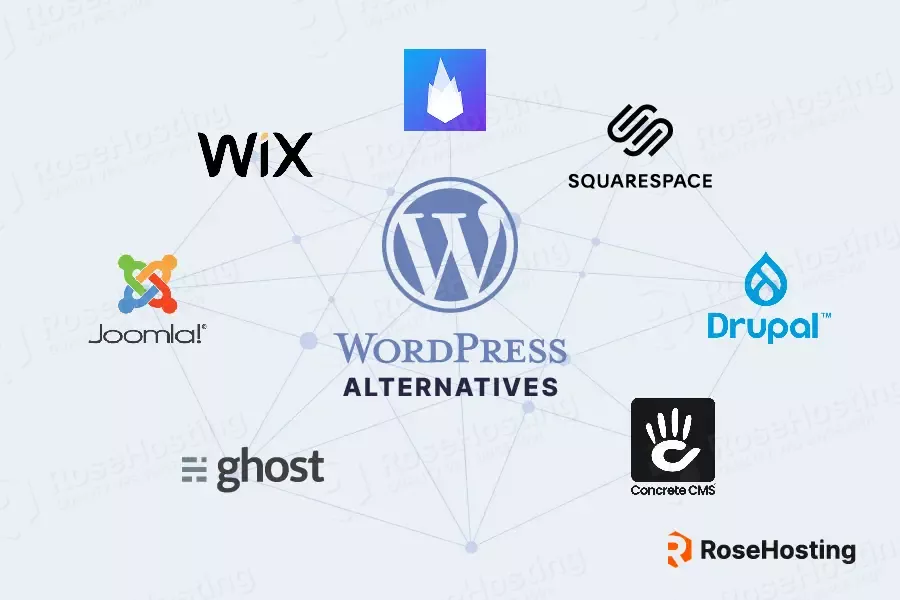
Best WordPress Alternatives for Website Creation in 2024
WordPress has long been the go-to platform for building websites, but it’s not always the perfect fit for everyone. Whether you’re looking for more customization options, easier usability, or a cheaper solution, there are plenty of Best WordPress alternatives for Website Creation out there. In this guide, we’ll explore the best website creation options available today. These platforms cater to a wide range of needs, from blogging to eCommerce and everything in between.
Why Consider a WordPress Alternative For Website Creation?
WordPress may dominate the market, but it’s not without its challenges. For one, beginners often find it overwhelming with its abundance of features and plugins. Additionally, managing updates, security, and hosting can be time-consuming.
If you want a platform that’s easier to use, offers more built-in functionalities, or provides better customer support, a WordPress alternative might be the better option. Fortunately, several alternatives simplify the website-building process while offering robust features.
1. Wix: Best for Ease of Use
Wix is one of the top Best WordPress alternatives for Website Creation, thanks to its drag-and-drop interface. It’s ideal for beginners who want to create a website quickly without any technical expertise. Wix offers hundreds of customizable templates, a vast app market for extra functionalities, and integrated SEO tools.
Moreover, it provides a free plan, though paid plans are available for those who need more features. Wix is perfect for personal blogs, portfolios, and small business websites. While it’s not as flexible as WordPress, it more than makes up for it with ease of use.
Pros:
- Intuitive drag-and-drop interface
- Hundreds of customizable templates
- Free plan available
Cons:
- Limited customization compared to WordPress
- Ads in the free version
2. Squarespace: Best for Design Flexibility
For users who want visually stunning websites, Squarespace is a fantastic option. Known for its sleek and modern designs, Squarespace offers an easy-to-use platform with beautiful, mobile-optimized templates. It’s a great WordPress alternative for photographers, artists, and designers.
Squarespace provides built-in tools for SEO, analytics, and eCommerce, making it a good option for online stores as well. Although it lacks the plugin flexibility of WordPress, it compensates with powerful in-house tools and excellent customer support.
Pros:
- Beautiful, modern templates
- Built-in eCommerce and SEO tools
- Strong customer support
Cons:
- Limited customization options
- More expensive than some other alternatives
3. Weebly: Best for Beginners on a Budget
Weebly offers a great middle ground between ease of use and functionality. Like Wix, it uses a drag-and-drop editor but with fewer design limitations. It’s an excellent choice for beginners who want to create a functional website quickly without spending a fortune.
Weebly also includes built-in eCommerce tools, making it a good option for small businesses. Its pricing is more affordable than some other alternatives, making it a fantastic WordPress alternative for budget-conscious users.
Pros:
- Easy to use
- Built-in eCommerce features
- Affordable pricing
Cons:
- Fewer design options
- Limited customization compared to WordPress
4. Shopify: Best for eCommerce Websites
If your primary goal is to run an online store, Shopify is a top-tier WordPress alternative. Shopify specializes in eCommerce and offers everything you need to sell products online. From inventory management to payment gateways, Shopify makes online selling simple and efficient.
What sets Shopify apart is its wide range of apps and integrations. Whether you’re a small startup or a large online retailer, Shopify can scale with your business. While it’s not the best option for general websites, it’s unbeatable for eCommerce.
Pros:
- Built specifically for eCommerce
- Easy-to-use interface
- Extensive app ecosystem
Cons:
- Not ideal for non-eCommerce websites
- Higher monthly costs
5. Ghost: Best for Blogging
For those focused primarily on blogging, Ghost offers a fantastic alternative to WordPress. Ghost is a lightweight, minimalist platform built specifically for bloggers and content creators. It’s known for its fast loading speeds and a clutter-free writing experience.
Ghost also offers powerful SEO tools and built-in subscription features, making it easy to monetize content. However, it lacks the range of plugins and themes that WordPress offers, which may limit design and functionality for some users.
Pros:
- Fast and lightweight
- Built for bloggers and writers
- Integrated SEO tools
Cons:
- Limited customization
- Not ideal for complex websites

6. Webflow: Best for Advanced Customization
Webflow is a unique platform that blends ease of use with advanced design features. It’s an excellent WordPress alternative for those who have coding skills or want more design control without learning to code from scratch.
With Webflow, you can fully customize your website’s design and functionality, making it ideal for designers and developers who want complete control over their website’s appearance. The platform also offers hosting, Search Engine Optimization tools, and eCommerce features, making it a comprehensive solution.
Pros:
- Advanced design control
- Great for designers and developers
- Built-in hosting and SEO tools
Cons:
- Steeper learning curve
- Higher pricing compared to other platforms
7. Joomla: Best for Advanced Users
Joomla is a powerful content management system (CMS) that offers a lot of flexibility for more experienced users. While it’s not as beginner-friendly as platforms like Wix or Weebly, Joomla provides advanced customization options for those who need it.
Joomla is open-source, just like WordPress, which means you can extend its functionality through a wide range of extensions. It’s an excellent WordPress alternative for users who are comfortable with a steeper learning curve but want greater control over their website.
Pros:
- Advanced customization
- Open-source with a large extension library
- Great for complex websites
Cons:
- Not beginner-friendly
- Requires more technical knowledge
Conclusion
Choosing the right Best WordPress alternatives for Website Creation depends on your specific needs. Whether you’re looking for a platform with better design options, easier usability, or advanced eCommerce tools, there’s an option out there for you. Platforms like Wix, Squarespace, and Shopify offer simple, user-friendly solutions, while Webflow and Joomla provide more advanced customization for experienced users. Consider your website’s goals, budget, and your technical skill level when deciding which platform suits you best.
By exploring these WordPress alternatives, you can find the perfect website builder that meets your requirements and helps you create a stunning, functional site.